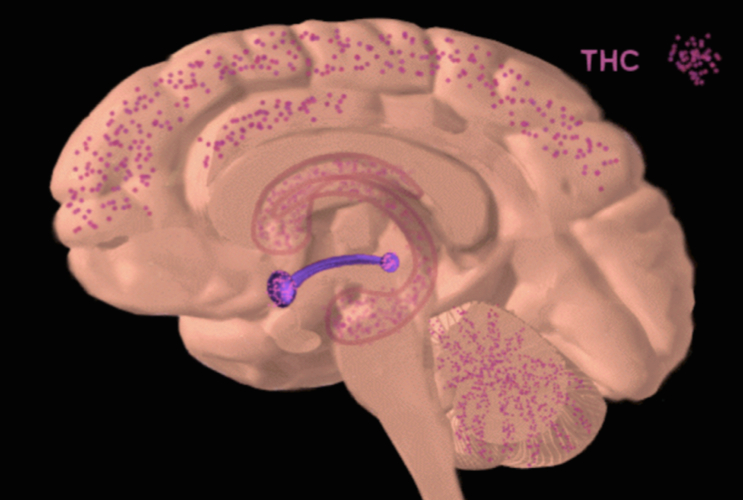Chronic marijuana users have less gray matter in the orbital frontal cortex, a region of the brain that the Los Angeles Times accurately describes as “a key node in the brain’s reward, motivation, decision-making and addictive behaviors network.”
The findings, reported by researchers at the University of Texas’ Center for BrainHealth and the Albuquerque-based Mind Research Network, are published in the prestigious Proceedings of the National Academy of Sciences.
“What’s unique about this work is that it combines three different MRI techniques to evaluate different brain characteristics,” Dr. Sina Aslan, founder and president of Advance MRI, LLC and adjunct assistant professor at The University of Texas at Dallas, told the Center for BrainHealth. “The results suggest increases in connectivity, both structural and functional, that may be compensating for gray matter losses. Eventually, however, the structural connectivity or ‘wiring’ of the brain starts degrading with prolonged marijuana use.”
Researchers say the age of onset — meaning the age at which someone starts using marijuana — and duration of use have unique effects on brain development. Some of the brain differences they observed in regular marijuana users are differences that already have been reported in studies of mice.
The researchers studied 48 “chronic” users and 62 non-users matched by age and gender. They also controlled for tobacco and alcohol use. The researchers defined chronic users as people who used marijuana at least four times a week — and participants in their study consumed the drug an average of three times a day. (Side note: still more evidence that marijuana is addictive.) Subjects were an average age of 28 to 30 years old.
Researchers found in chronic users smaller gray matter volume and greater structural and functional connectivity directly correlated to the severity of marijuana use. The more intense “connectedness” could be the brain’s way of compensating for the shrunken gray-matter regions.
“To date, existing studies on the long-term effects of marijuana on brain structures have been largely inconclusive due to limitations in methodologies,” said Dr. Filbey. “While our study does not conclusively address whether any or all of the brain changes are a direct consequence of marijuana use, these effects do suggest that these changes are related to age of onset and duration of use.”
More research is needed to determine whether:
- the changes observed revert to a normal state once marijuana use stops
- similar effects are found in occasional marijuana users versus chronic users,
- the effects observed in this study are a direct result of marijuana use or a predisposing factor. A 2012 study found that 12-year-olds with smaller orbitofrontal cortices were more likely to start using marijuana by age 16. This possibly signals a predisposition to marijuana use in youth with these brain-region deficits.
Read More
We invite you to review the full study, titled “Long-term Effects of Marijuana on the Brain,” here. The research was funded by the National Institute on Drug Abuse to Dr. Francesca Filbey (R01 DA030344, K01 DA021632). Authors: Francesca M. Filbeya,1, Sina Aslana,b, Vince D. Calhounc,d, Jeffrey S. Spencea, Eswar Damarajuc, Arvind Caprihanc, and Judith Segallc



Just off the top of my head, studies have found abnormalities associated with pot use in the striatum, thalamus, amygdala, nucleus accumbens, global palladium, orbitofrontal cortex, precuneus, and fimbria. I look at it this way: my own experience (37 years of marijuana use) and those of friends who use indicate damage to memory, motivation, judgment, cognitive ability, and emotional maturity. Social science has tracked pot users in long-term studies and found negative life outcomes right in line with those experiences. And now brain imaging is finding abnormalities in parts of the brain involved in exactly the same mental processes that control memory, motivation, judgment, cognition, and emotion. Three layers of evidence are hard to dismiss.
Thanks very much for sharing your thoughts — and a little about your experience — with us, Preston. We deeply respect people in substance recovery who speak on these issues publicly. Your voice is very important — and one our country doesn’t hear nearly as often as it should. We hope you’ll continue to chime in here on DrThurstone.com early and often. We also wish you well and hope you’ll contact us if you think we could in any way be helpful to your sobriety.